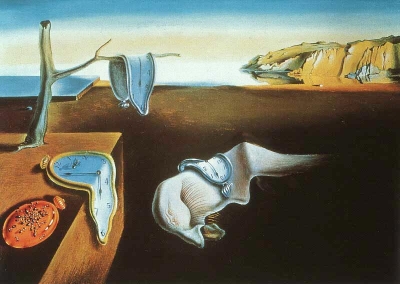ちばけんさんの おぼえた日記 - 2016年12月21日(水)

この日記をフォローしているユーザ
この日おぼえたフレーズ(英語・中国語・ハングル)
- おぼえたフレーズはありません。
おぼえた日記

'Surreal' is named 2016 'Word of the Year'
[AFP, Dec.20]
Donald Trump's upset win in the US presidential election astonished people so much that they rushed to the dictionary to look up the word everyone was using to describe the event: surreal.
Indeed, Merriam-Webster's dictionary on Monday named surreal its Word of the Year 2016, the honor given to the word or term with the sharpest spike in look-ups over the previous year.
Surreal, definition: marked by the intense irrational reality of a dream.
ドナルド・トランプ氏が予想外の勝利を収めたことに唖然とした人々は、この出来事を表すために使われていた言葉を辞書で調べた──その言葉は、Surreal。
(写真はウェブスターに掲載のSurrealだが’ダリ’の絵と差し替え)
英語辞典メリアム・ウェブスターは19日、「Surreal」を2016年の「ワード・オブ・ザ・イヤー」に決定したことを発表した。この賞は、前年に比べて検索件数が急増した言葉や表現に対して贈られる。Surrealとは非現実的なといった意味。
It actually triggered not one but a series of sudden jumps in people looking it up.
The first came after terrorist bombings in Brussels in March. Thirty-two people died, as did three attackers.
It happened again in July after the coup attempt in Turkey and the terrorist attack in Nice, France in which a man driving a truck swerved back and forth through a crowd watching Bastille Day fireworks, crushing 86 people to death.
But the biggest spike came after Trump -- the tweeting, shoot-from-the-hip political neophyte and property tycoon who insulted women, minorities and Muslims during the campaign -- defeated Hillary Clinton during the November 8 race for the White House.
しかし、この言葉が最も多く検索されたのは、11月8日の米大統領選でトランプ氏が民主党候補のヒラリー・クリントン氏に勝利した直後だった。ツイート好きで衝動的、政治未経験で、選挙活動中に女性や少数派、イスラム教徒たちを侮辱していた不動産王のトランプ氏の勝利を説明するのに、この言葉が広く使われたためだ。
When we don't believe or don't want to believe what is real, we need a word for what seems “above” or “beyond” reality. Surreal is such a word, the dictionary company said in a statement.
メリアム・ウェブスターは声明で、「われわれは現実に起きていることを信じられない、あるいは信じたくない時に、現実を”上回る”あるいは”超える”と思える物事のための言葉を必要とする。超現実的とは、そのような言葉だ」と説明している
It said another word looked up big-time in 2016 was 'bigly.'
Donald Trump used the term 'big league' in an unusual way, as an adverb during a debate, and many people thought he said 'bigly', said Merriam-Webster editor-at-large Peter Sokolowski.
Bigly actually is in the dictionary, and means in great scope, or with a blustering manner.
Clinton's use of deplorable as a plural noun to describe some of Trump's supporters -- a basket of deplorables -- was also a top trending word for 2016, Merriam-Webster said.
〇シュールレアリスムというと中学の美術でならった。ミロ、ピカソ、ダリなど。
これ以外の作家で具象された絵はあまり好きになれない。とうよりわからない。
やはりトランプと通ずる。
*****************
〇しごとの基礎 (Season2) Week12 VIP視察への対応
Case 47 VIPの提案に感謝の姿勢を見せる
待望のフロOKを見て、興奮する王子。実際に手を取って操作している。歌詞は表示されないと聞かされた王子は、おけの内側に歌詞を表示してはどうかと提案する。
Amy: Obviously, that would be too costly.
<気分を害した王子。帰る準備を始める>
Prince: Well, I have seen enough. We should go.
Yumi: No. wait!
Miki: <三木が急いでアキたちを呼び寄せる> the prince is disappointed.
Chad: We should respect his idea more. Tell him.
Aki: アイデアのご提案ありがとうございます。よく考えてみたいと思います。
Prince: My idea would greatly improve FuroOK.
◆Words & Phrases
Obviously 明らかに
would でしょうね(仮定法です。王子の提案をあまりシリアスに捉えず「(もしそんなことをしたら)高くつくでしょうね」)と可能性が低いことを示しているのです。そりゃ当然むくれますね)
costly 高くつく respect 尊重する (「価値を認める」ということです)
improve 改善する
◆Key Phrase
アイデアのご提案ありがとうございます。よく考えてみたいと思います。
We are really grateful for your input, and we will definitely consider it.
たいへん上手な受け答えですね。まず深い感謝をreally grateful と言って示し、そしてdefinitely (絶対、必ず)を使って「考慮します」を十分に強調。もちろんあくまでも検討ですから、「実現します」といった後日問題になる言質は与えていません。be gratefulは「感謝いたします。」thank you.とは異なり居ずまいを正し、かしこまったお礼です。たとえば、自分の親が世話になった医師に退院時「どうもありがとうございました」と言う雰囲気です。相手の好意を「上」に置き感謝、そうした心情が流れているのです。inputは「入れること」。ここでは「アイデア」ですね。
◆Another Option
Thank you so much for your feedback. We’ll certainly consider adopting your idea.
ご意見本当にありがとうございました。採用できるか(その可能性を)しっかり検討することにします
certainly も「確実に・間違いなく」。同種のsurelyよりも力強い表現です。。。consider の後ろはto不定詞を取りません。considerは状況をありありと想像する動詞。リアリテイを感じるーingがベストなんです。
**************
〇基礎3 Episode 31 Merry Christmass!
L-123 This is for you, Asuka
◆Can-do 過去の経験や出来事について話せる
私はおなじものを買うつもりだったんです。
I was going to buy the same thing.
☑be going toはこれからする予定に関して言う表現なので、I was going to…と過去形で使うと、「(その時点で)~しようと思っていた/するつもりだった(でもしなかった)」と言う意味になります。
私はいいプレゼントが思いつきませんでした。
I couldn’t think of any good present.
☑このcouldn’tは一般的な能力を表すcan(~できる)の過去形です。「思いつかなかった」というときにこのような表現をします。
◆GRAMMAR
It’s time for us to give presents.
私たちがプレゼントを渡す時間です。
for us という不定詞の意味上の主語をはさんで、to以下はtimeを修飾する不定詞の形容詞用法です。
It’s [time for us to give presents].
,,,,,,,↖⇐↲
次の文と比べてみましょう。
It’s nice to give presents.
↖⇐------↲
プレゼントを渡すのはステキです。
Itはto不定詞以下を受ける形式主語で、to以下は主語を表す名詞用法です。














コメントありがとうございます。
もともとは芸術、美術から発していることばなので、良い意味かと思うのですが。超現実で信じたくないということなのでしょうね。